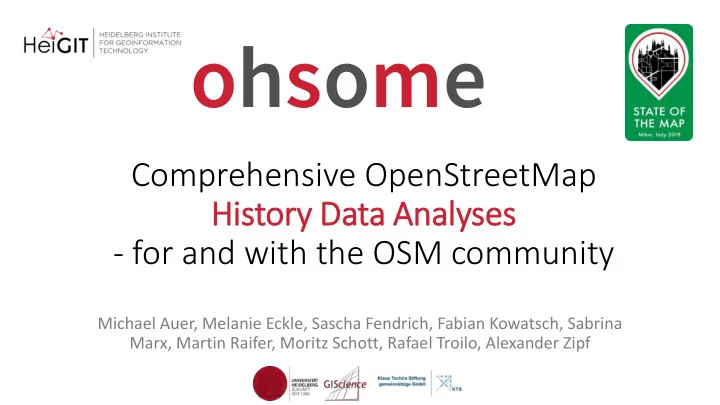

ohsome Comprehensive OpenStreetMap History Data Analyses - for and with the OSM community Michael Auer, Melanie Eckle, Sascha Fendrich, Fabian Kowatsch, Sabrina Marx, Martin Raifer, Moritz Schott, Rafael Troilo, Alexander Zipf
ohsome ? 1. OhSoMe: OpenStreetMap 2. OHsome: OpenStreetMap History (something) 3. Ohsome: sounds just „ awesome “ 2
Workshop NEXT SESSION! Exploring OSM's history using the "ohsome" data analysis platform 14:00h S.1.5 29.07.2018 3
ohsome Big ig Spa patial ial Dis isas aster er and and Data a humanitar humanit arian an Anal nalytics ics management mana gement 29.07.2018 4
OSM History Data Analysis • What can we learn from the History? time • Development of the data DATA QUALITY • Development of the users • Development of spatial/thematic (sub-)communities data user COMMUNITY DYNAMICS 29.07.2018 5
OSM History Data Analysis • The Challenge? • Make the whole data treasure available to the public • Queries of arbitrary temporal and spatial resolution • No pre-filtering / no clean-up • BIG DATA • High performance (parallel and distributed) • Flexible (run it on local PC or on computing cluster) • Usability (Easy to use for different target groups) • Different API Levels 29.07.2018 6
Examples: Data Quality Auer, M., Eckle, M, Fendrich, S., Griesbaum, L., Kowatsch, F., Marx, S., Raifer, M., Schott, M., Troilo,R. & Zipf, A. (2018): Towards Using the Potential of OpenStreetMap History for Disaster Activation Monitoring Proceedings of the 15th ISCRAM Conference – Rochester, NY, USA May 2018 29.07.2018 7
Examples: Data Quality Auer et al. 2018 29.07.2018 8
Examples: Data Quality Auer et al. 2018 29.07.2018 9
Examples: Data Quality Auer et al. 2018 29.07.2018 10
Commnunity Dynamics 11
Examples: Community Dynamics 29.07.2018 12
Examples: Community Dynamics 29.07.2018 13
Can I use it? Usability ohsome API OSHDB API Flexibility OSHDB* * OSHDB = OpenStreetmap History Database 29.07.2018 15
Can I use it? • OSHDB API: Current version 0.4 available on Github https://github.com/giscience/oshdb • ohsome API: https://api.ohsome.org Workshop NOW! (global coverage coming soon!) 14:00h S.1.5 • KLL Nepal Dashboard 29.07.2018 16
OSHDB API 29.07.2018 17
ohsome API https://api.ohsome.org Web API documentation with example requests 29.07.2018 18
Webapp using ohsome API: Nepal-Dashboard https://ohsome.org/apps/kll-dashboard-preview/ 19
Webapp using ohsome API: Nepal-Dashboard 20
The end info@heigit.org Thank you for your attention! Workshop NOW! Exploring OSM's history using the "ohsome" data analysis platform 14:00h S.1.5 29.07.2018 21
Examples: Community Dynamics 29.07.2018 22
Examples: Community Dynamics 29.07.2018 23
Grid-Partitionierung der Welt OSHEntity enthält OSHWayGridCell enthält in gleich große Zellen OSHEntity Objekte in einem räumlichen Index OSMEntity Objekte Zoom 0 id = 1234 type = WAY OSH OSM OSH timestamp = n version = 1 OSH tags = [building=yes] Zoom 1 nodes = [3, 2, 1] OSH OSH OSH OSM OSH timestamp = n -1 OSH version = 2 tags = [building=yes, addr:housenumber=42] Zoom 2 OSH nodes = [3, 2, 1] OSH Id = 1234 . . . OSH type = WAY OSH
Grid-Partitionierung der Welt OSHEntity enthält OSHWayGridCell enthält in gleich große Zellen OSHEntity Objekte in einem räumlichen Index OSMEntity Objekte Zoom 0 id = 1234 type = WAY OSH OSM OSH timestamp = n version = 1 OSH tags = [1] Zoom 1 nodes = [3, 2, 1] OSH OSH OSH OSM OSH timestamp = n -1 OSH version = 2 tags = [1, 5] Zoom 2 OSH nodes = [3, 2, 1] OSH Id = 1234 . . . OSH type = WAY 1 = 900 member ids = OSH 2 = 1000 3 = 1001 tag ids = 1 = [0,6] 5 = [2,4] members OSHEntity Keytables Valuetables (0, 0) = yes 0 = building 1 = highway (0, 1) = residential (2, 0) = 2 2 = addr:housenumber ... ...
Recommend
More recommend